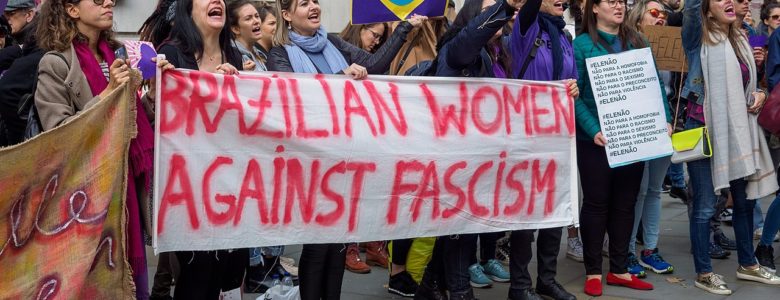
A statement of Solidarity with the people of Brazil
DiEM25 is extremely concerned about the results of the Brazilian election, which has brought to power an extreme-right regime. We express solidarity and support to all Brazilians during this difficult time — especially the opposition, which Jair Bolsonaro has threatened with persecution and violence.
To the people of Brazil, we say:
Don’t be paralysed by fear. Get organised. Educate those who were misled to vote against their interests. Exercise constructive disobedience. Watch closely public policies, institutional developments, and budget allocations. Do not let Bolsonaro’s hate speech lead the way.
Build a progressive agenda of your own and promote it. Connect with other movements across the world, and create a common space for resistance, as we are trying to do with our Progressive International.
Stay united, creative and politically active.
Fight the old and build the new!
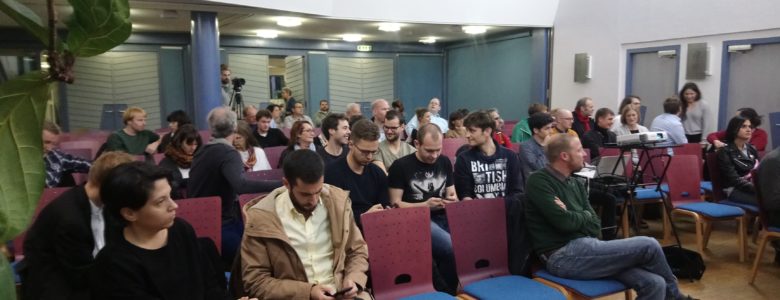
European Spring alliance grows with new members Actúa and Nouvelle Donne!
Following the official presentation of our European Spring electoral programme in Warsaw last June, this time we gathered in Frankfurt to welcome two new members to our growing alliance, Actúa and Nouvelle Donne, and finalise the ground-breaking electoral programme that we will take to a ballot box near you in May 2019!
Here’s what happened:
The day kicked-off at DGB – Gewerkschaftshaus in Frankfurt, with a short introduction by David Adler (DiEM25) and Agnieszka Dziemanowicz-Bak (Razem, co-chair of European Spring Council).
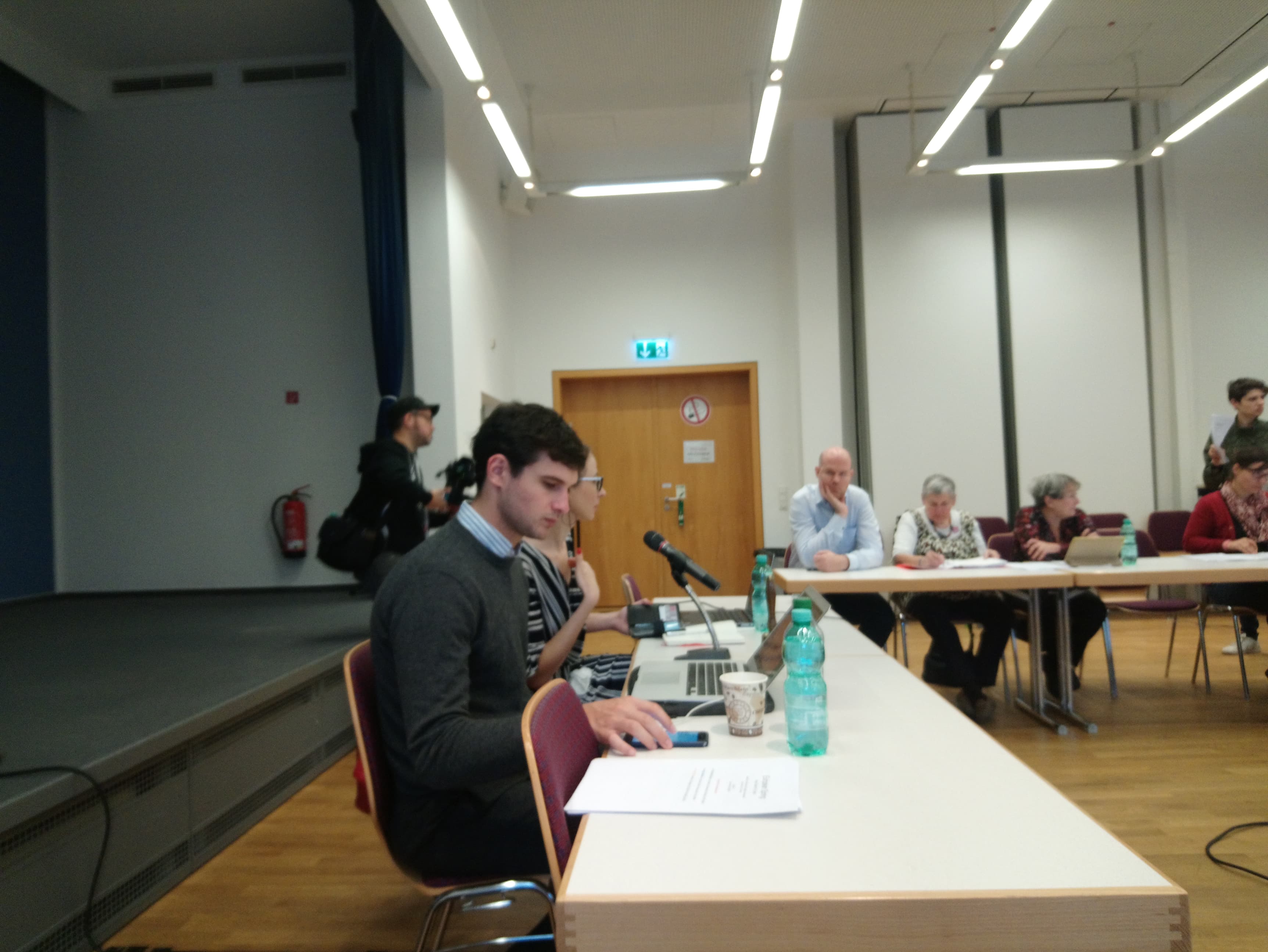
Each European Spring Council representative then gave a short update about the political situation in their countries: Poland, Portugal, Spain, Germany, Denmark, Greece and France.
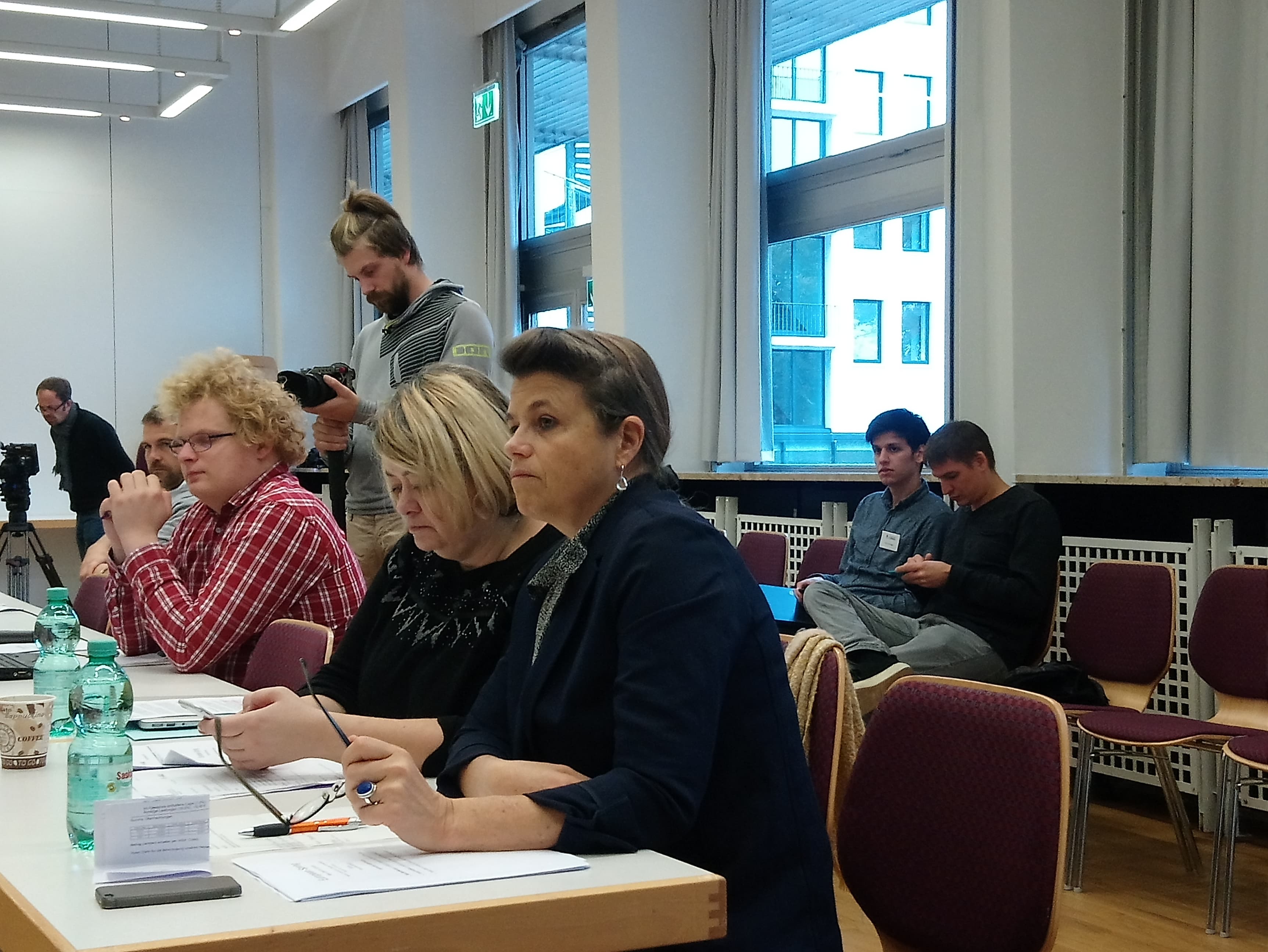
These country-by-country updates were followed by a discussion of the 27 pages of comments and amendments that we received from members of the public on our Green New Deal for Europe electoral programme.
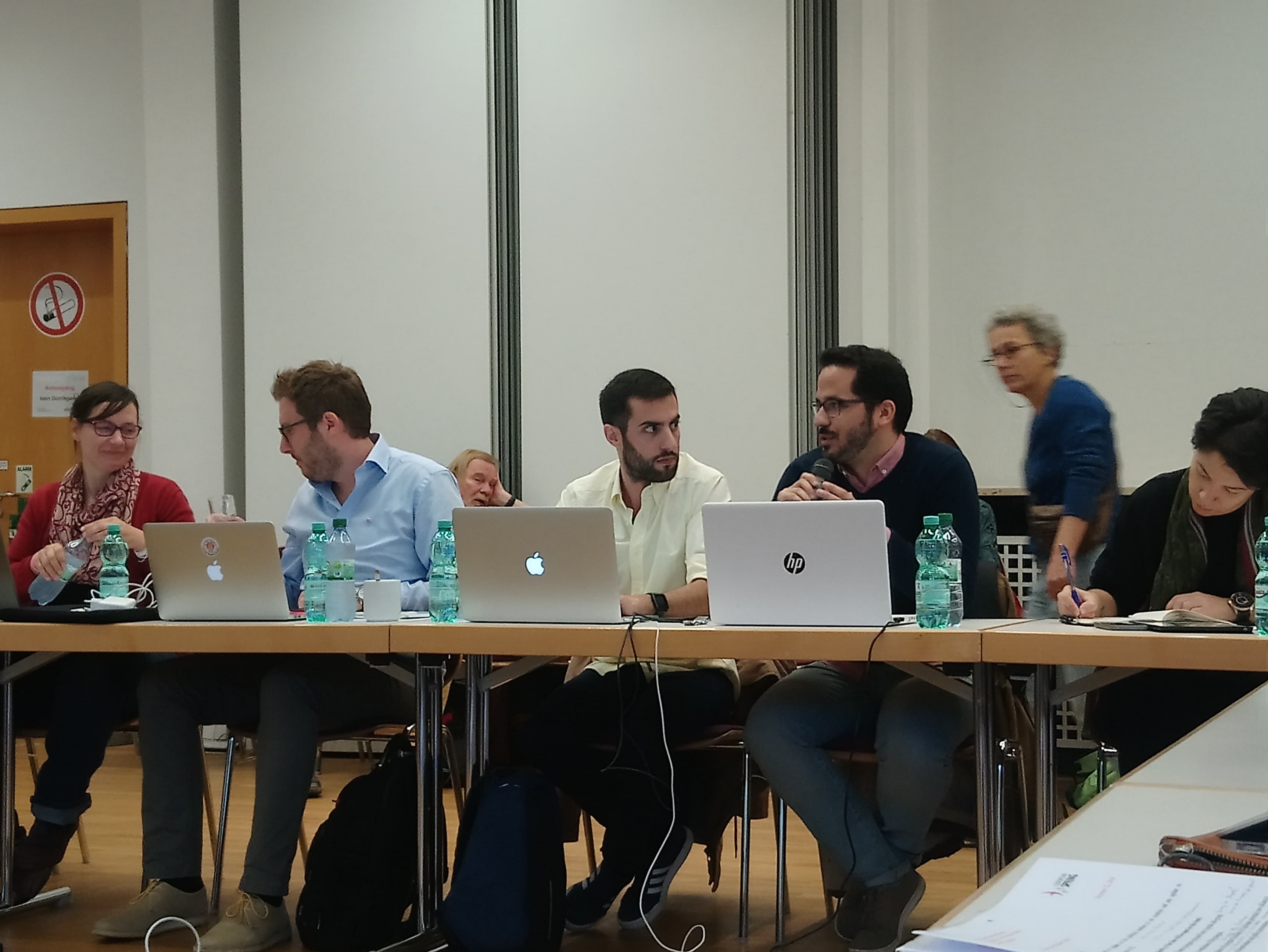
After a detailed discussion, the European Spring Council approved the electoral programme, together with an additional document entitled ‘A Sustainable Way of Life: European Spring’s Vision for Europe’, which lays out the European Spring‘s vision on municipalism and sustainability.
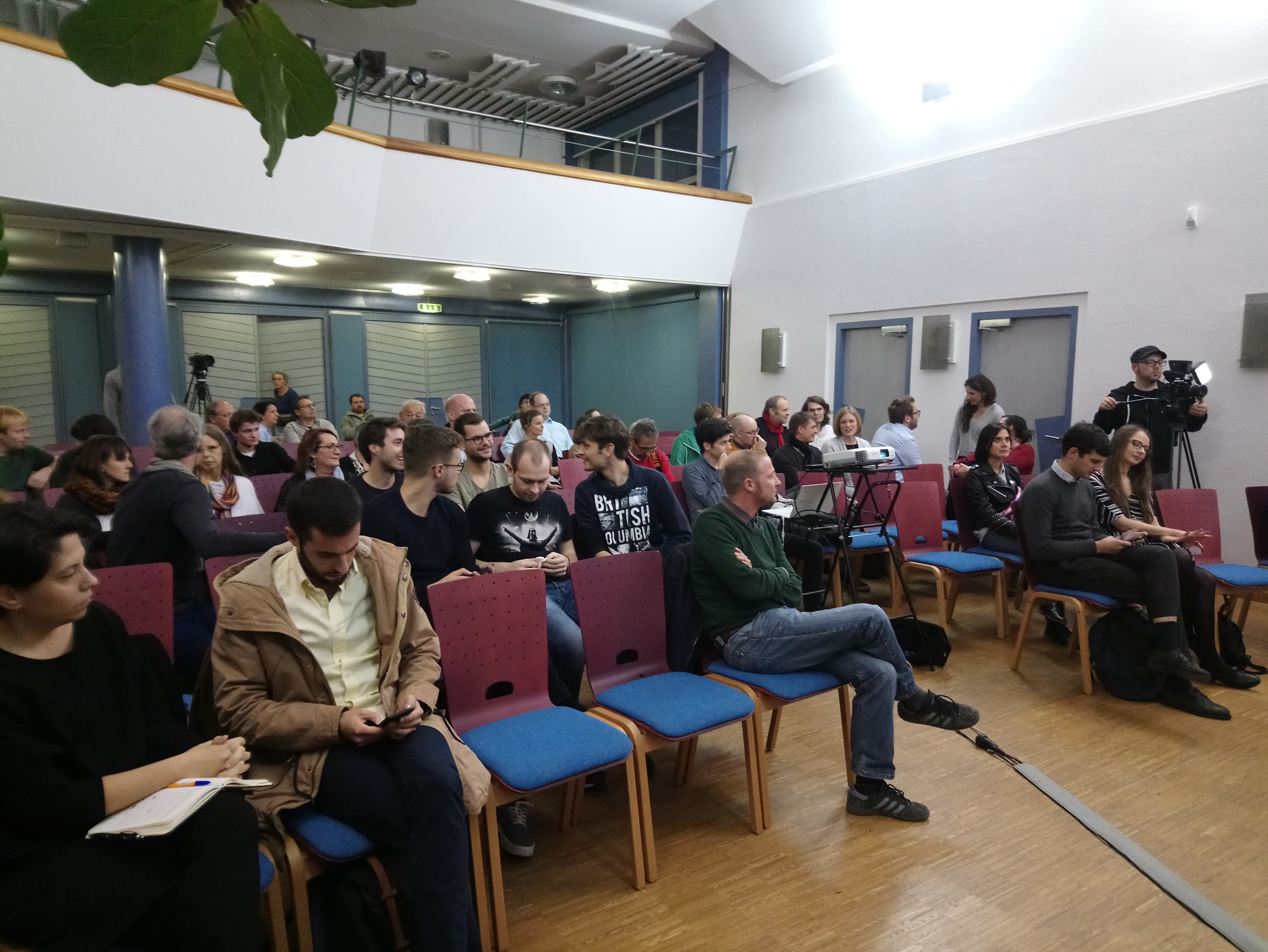
We started the public session later in the evening by showing our latest video presenting European Spring.
David Adler (DiEM25) and Agnieszka Dziemanowicz-Bak (Razem, co-chair of European Spring Council) then took to the stage to present the outcomes of the 4th European Spring Council meeting.
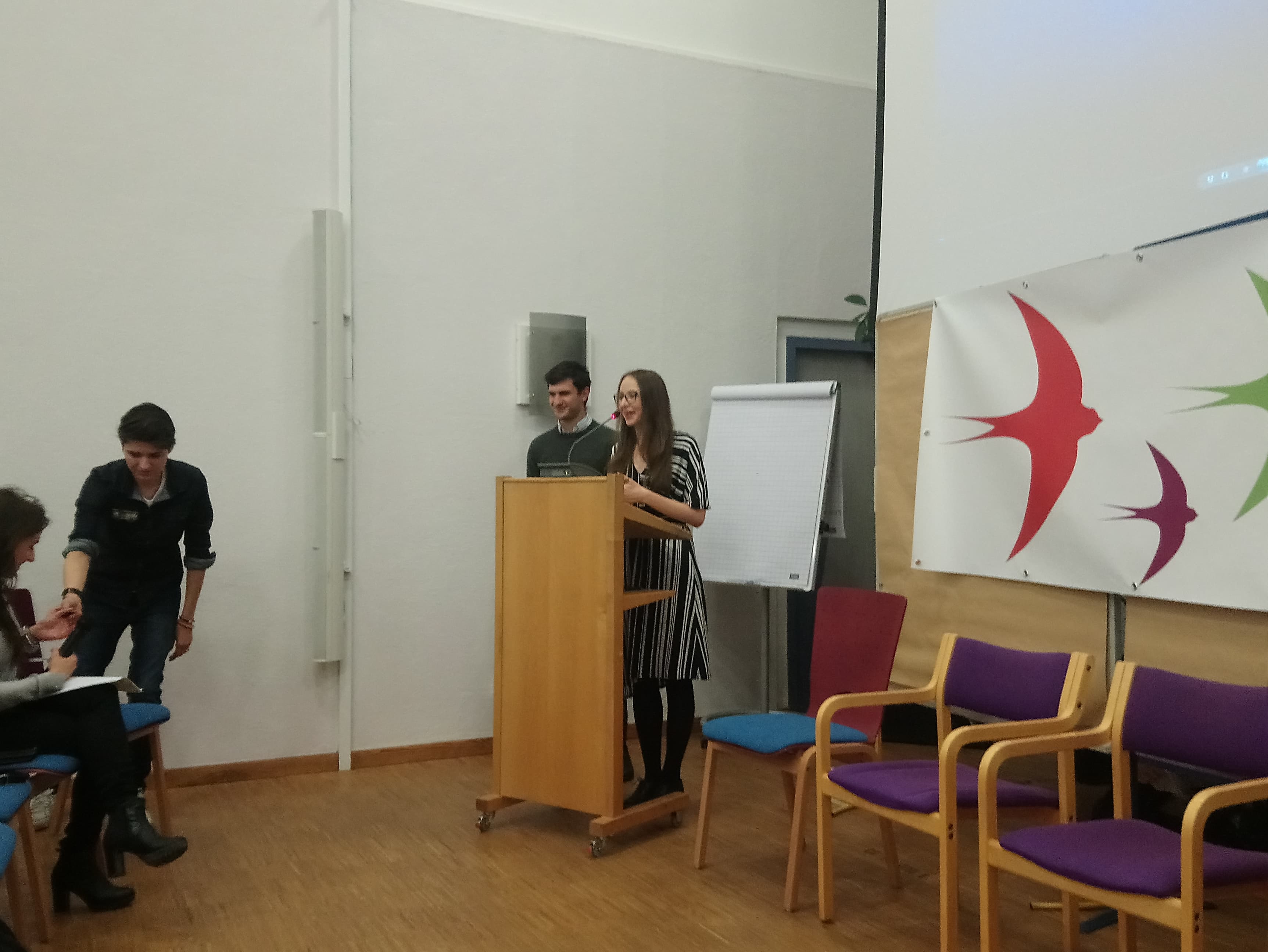 This was followed by a video message from Yanis Varoufakis, DiEM25 co-founder, and Lorenzo Marsili, DiEM25 Coordinating Collective member, who were in Rome on the same day to officially present the electoral bid of our Italian electoral wing ahead of the May 2019 European Parliament elections.
This was followed by a video message from Yanis Varoufakis, DiEM25 co-founder, and Lorenzo Marsili, DiEM25 Coordinating Collective member, who were in Rome on the same day to officially present the electoral bid of our Italian electoral wing ahead of the May 2019 European Parliament elections.
The public session concluded with a question and answer session between members of the European Spring Council and the audience.
The European Spring Council will meet again later this year, with the location yet to be announced.
As before, the conclusions of this meeting will soon be made available online by all participating organisations.
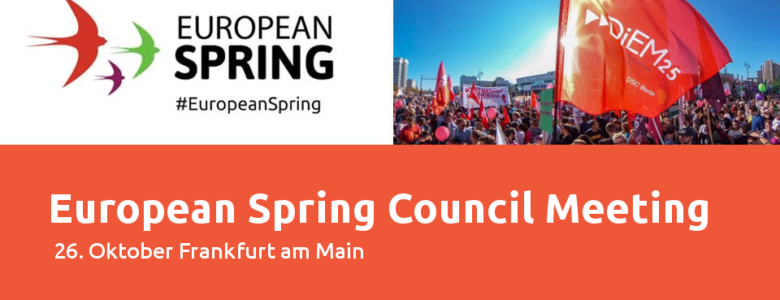
The European Spring is arriving in Frankfurt on October 26!
The European Spring will arrive in Frankfurt am Main on October 26, 2018, to mark the beginning of the democratisation of Europe in Germany.
After the alliance of eight European partners had already met in Naples (1st Council Meeting), Lisbon (2nd Council Meeting), Paris (3rd Council Meeting) and Warsaw (European Spring Launch), the 4th official Council Meeting will now take place in Frankfurt – the city of finance and home of the European Central Bank, a place where everything may have begun?
The domination of the financial sector over states, people and even our continent is no longer just a rumour. It is reflected in paralysed governments that are shying away from taking the courageous step of regulating this sector, thereby depriving Europe of the opportunity to emerge from the perpetual crisis.
There is also an urgent need to create a European labour market of equal opportunities based on the moral standard that all people across our diverse continent can live a meaningful life without fear and suffering.
However, an ethical approach in politics, in the current situation, will unfortunately be sought in vain. From the point of view of the political stakeholders people are, above all, voters. As harmless as this difference may seem at first sight, one can simply become a voter through a single action which is voting. Though, being human is manifesting itself in its characteristics and needs in a much more complex way. Perhaps that is why the “homo sapiens” is the most unpopular target group in the political landscape.
The practice of democracy today continues to be emotionally influenced by disinformation, idealisation and hollow populism. Rage elections and protest elections increasingly result in protagonists spreading fear and agony as a permanent concept. They end up in bizarre excesses of already failed ideologies which rather seem like a bad joke or a parody of past decades.
European Spring, called “europäischer Frühling” in German, is the alliance of people who enter the political stage together – beyond national borders – in order to implement, as Europeans, their human rights, their free development of personality and their right to a sustainable living space. We do not need to fight in resistance. We only need to break our own internal resistance which makes us believe that there is no way of freeing ourselves from the on-going crisis. It is obvious that a certain established circle seeks to ensure self-preservation by promoting nationalist, fascist ideologies and by keeping Europe stuck in an unscrupulous system. In the end it aims at even taking away from us a peaceful future with endless possibilities of the 21st century.
The goal is clear; the European Spring has set itself the mission of adopting a new approach, making a new beginning in our European society. Its political programme “A New Deal for Europe” and the integration of more people, parties and organisations will be the way.
At this 4th Council Meeting we will also have the pleasure to welcome two new partners, Nouvelle Donne from France and Actúa from Spain.
We cordially invite you to attend our event in Frankfurt am Main on Friday, October 26, to convince yourselves of the dynamics and the credibility of this alliance. The toxic system of the current political structure in Brussels must be abolished, together, step by step, in order to provide the conditions for equitable participation of men and women in a humanist Europe.
Julijana Zita
Diem25 / Mitglied im Vorstand Demokratie in Europa
Translated from German to English, by Luisa Barbas (NC DiEM25 Germany)
>> European Spring members
DiEM25, Demokratie in Europa, MeRA25, demA, Generation-s, Razem, livre, alternativet, Demokratie in Bewegung, Actúa und Nouvelle Donne
>> Organisational team
DiEM25: Julijana Zita & Raphael Zikesch,
Demokratie in Bewegung: Claudia Trapp & Johanna Hansen
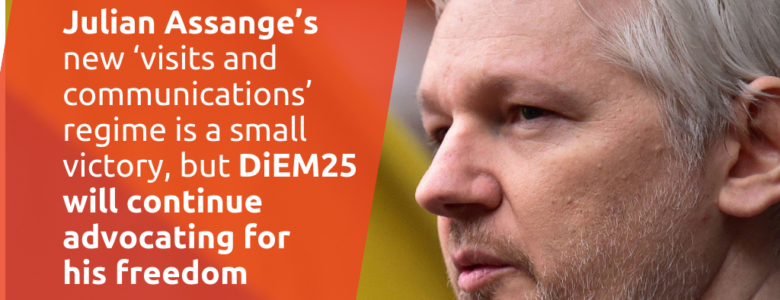
Julian Assange’s new ‘visits and communications’ regime is a small victory, but DiEM25 will continue pushing for his freedom
Our efforts as a legal team demanding respect for the basic rights of DiEM25 Advisory Panel member Julian Assange have achieved a small victory. Our requests were heard out by both the UN High Commissioner for Refugees and the UN Special Rapporteur on the promotion and protection of the right to freedom of opinion and expression. Both share the role of ensuring that countries live up to their international legal obligations, without exception. The government of Ecuador, after meeting them, then lifted some of the restrictions he is subjected to, and restored access to his electronic communications (read the official “protocol” regulating Julian’s visits, communications and medical assistance here).
While we welcome this development, we want to call your attention to the fact that we have ongoing concerns over and above these restored communications. We refer to the restrictions imposed by Ecuador on Julian’s freedom to speak, his work as a journalist and his private life, including major intrusions on his privacy and on the privacy of his visitors.
We believe the new “protocol” regulating Julian’s visits, communications and right to medical assistance are insufficient and remain inhumane. In addition, we strongly suspect that such a new “protocol” is not about genuinely restoring Julian’s rights to free speech and improve his living conditions. Instead, this latest development seems to be more of an Ecuadorian Government’s PR operation that aims to: 1. appease the loud voices denouncing the systematic violation of Julian’s human rights, as well as calling for his immediate release, and 2. Set up an arbitrary legal minefield to easily trigger – and justify – Julian’s ejection from the Ecuadorian embassy.
This protracted situation needs urgent action from both the government of Ecuador and the government of the UK, both of whom should take serious steps to end this situation by simply respecting international law.
The UK continues restricting even the most basic and humane access to sunlight and fresh air. It continues to refuse safe passage. It continues to break international human rights law by blocking Julian from his right to asylum. It is time for the UK to bring this situation to a prompt end by abiding by the UN ruling, which ordered his immediate release more than two years ago, guaranteeing that he won’t be extradited to the US.
As DiEM25, we will continue pushing for Julian Assange’s freedom until he is released.
Renata Ávila is a member of DiEM25’s Coordinating Collective, and Julian Assange’s legal team.
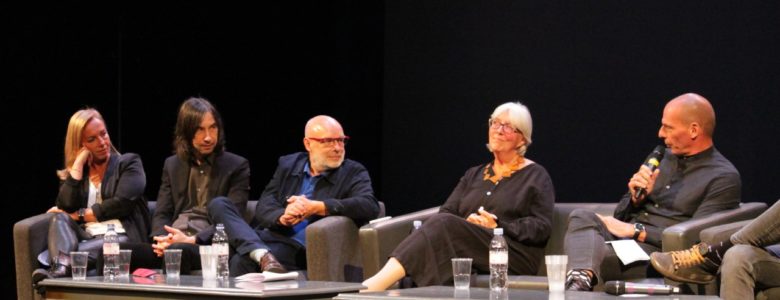
DiEM Voice packs a full house at “Here and Now” event in London
Last Wednesday, October 10, 2018, DiEM25 and DiEM Voice landed in London for their “Here and Now” event at the Platform Theatre, Central Saint Martins. Our movement brought together over 250 people, including DiEM25 activists from across the continent and a set of star speakers (such as Brian Eno and Bobby Gillespie) to put forward a case for democratising culture and the arts.
Event report
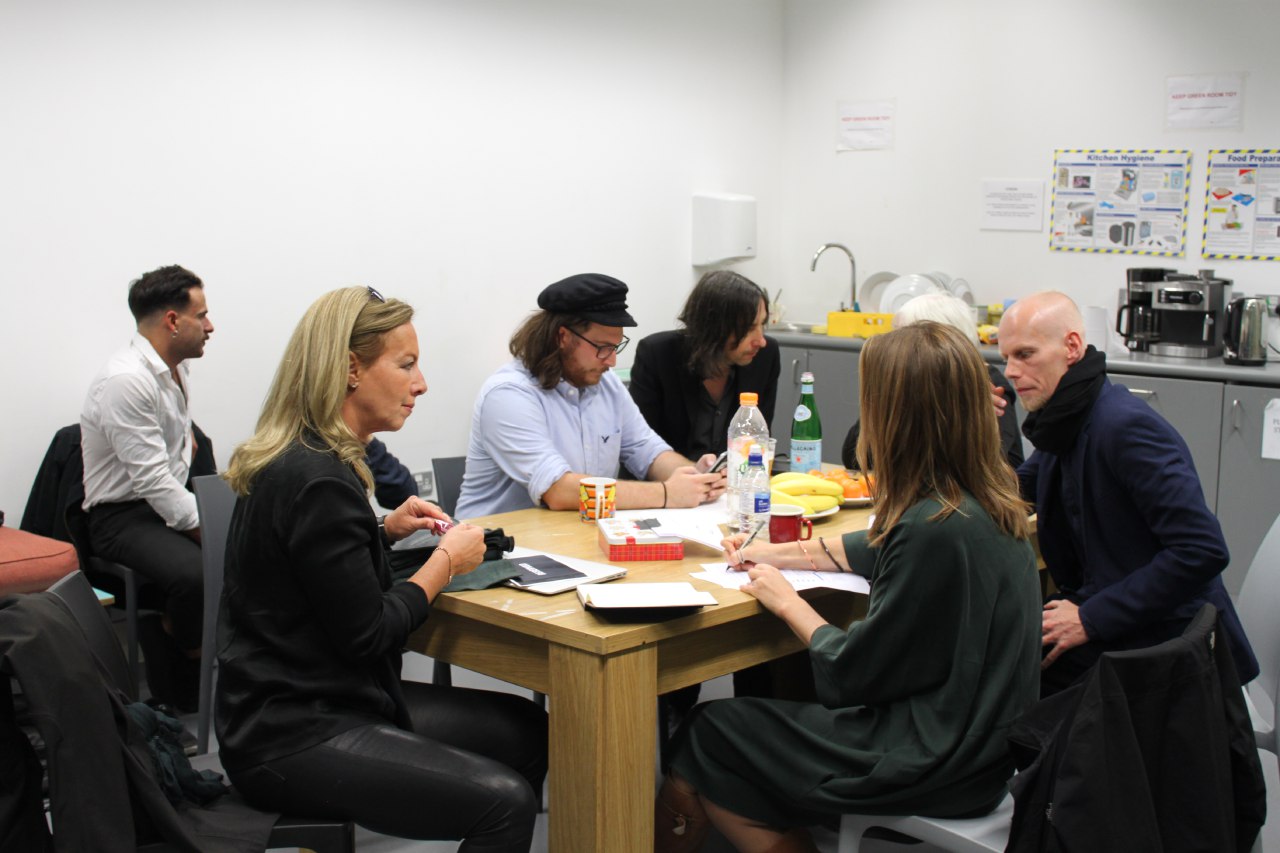
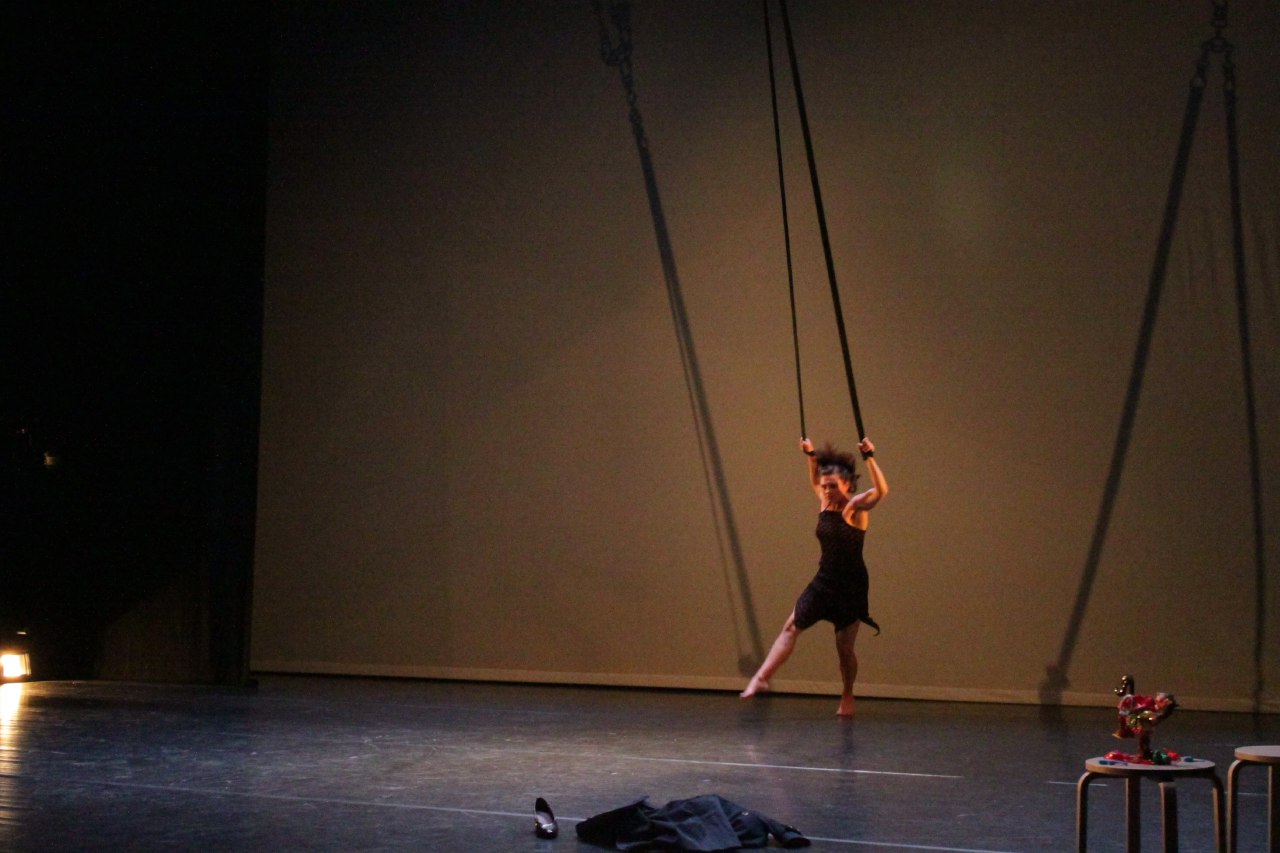
The evening started with an aerial straps piece by Kit Hill, DiEM Voice Coordinating Collective member, which saw her indicate that the dystopian future is already in the Here and Now.
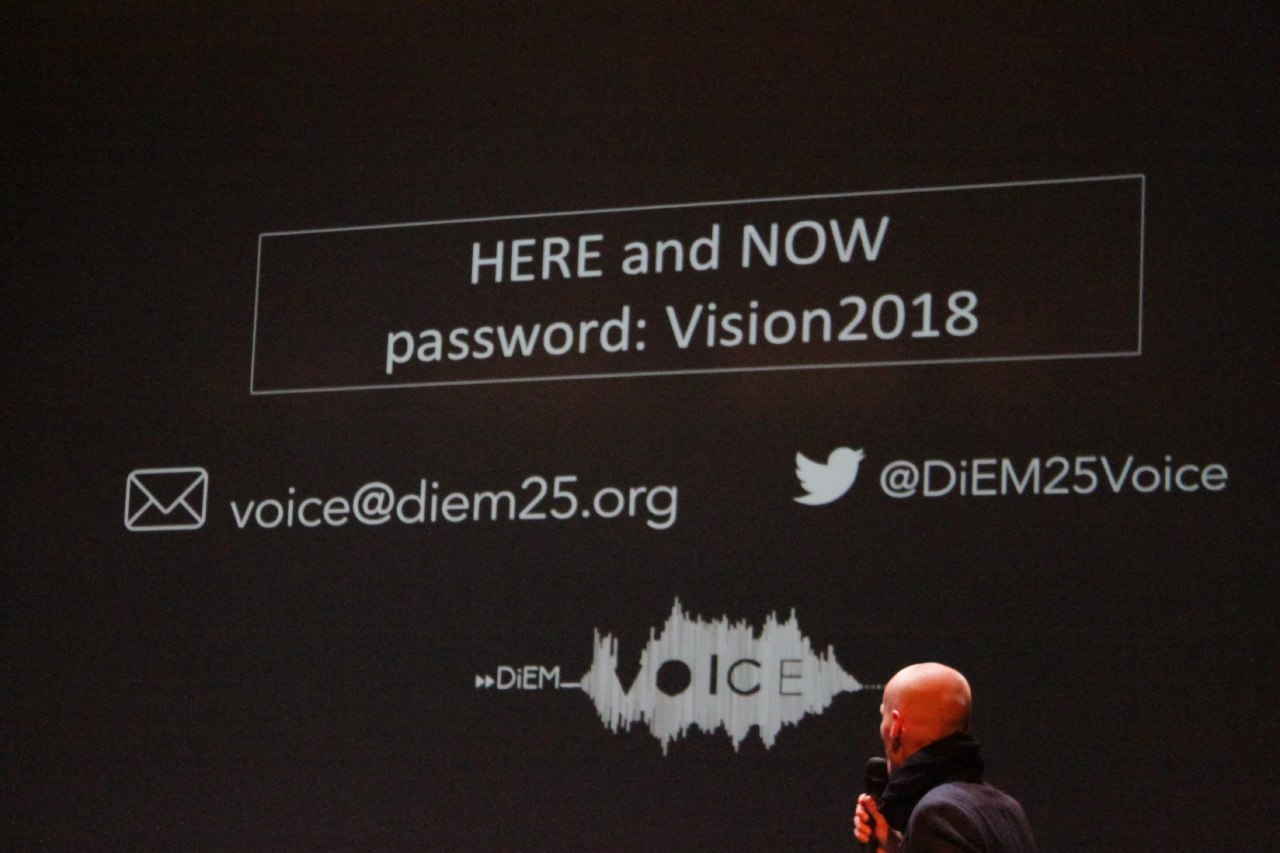
DiEM Voice Coordinating Collective member, Igor Stokfiszewski then opened the event by introducing the audience to DiEM Voice, explaining how people could participate by sending in questions for the moderator to feed into the discussion with the speakers.
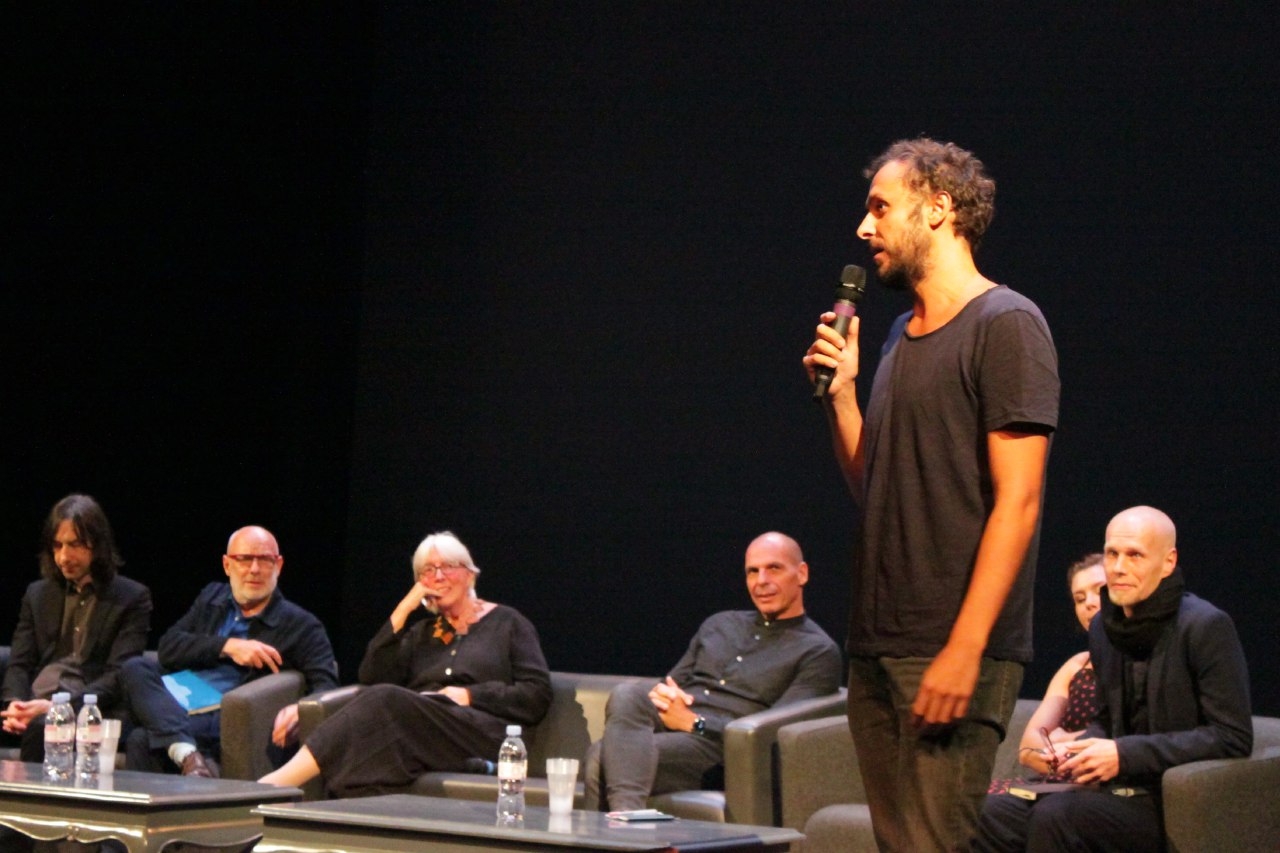
DiEM25 co-founder, Srecko Horvat, then set the scene by asking “…where are we ‘here and now’ when it comes to art and culture?”.
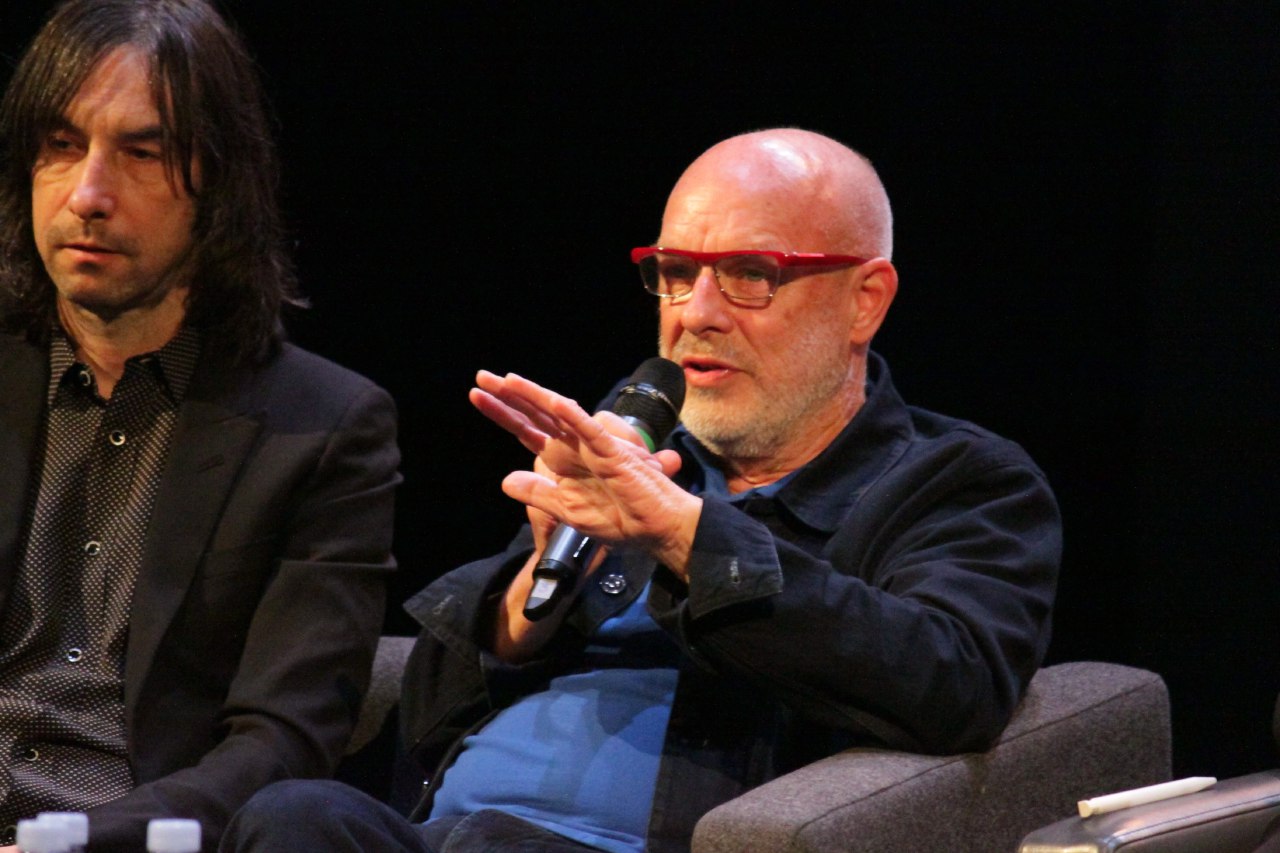
DiEM25 Coordinating Collective member, Brian Eno, then took to the floor to discuss the role and importance of art and creativity. He began by saying that “in nearly all discussions about art, hardly anybody ever asks, and nobody ever answers the question: what does it actually do for us? So at the centre of all this discussion about different kinds of art and what artists are doing, nobody says why does art actually exist”.
He continued, “children learn through play and adults play through art”, later adding that “totalitarians discourage creative behaviour. They like art #artbut only as advertising, as propaganda, because it consolidates the system”. Eno concluded by saying, “the point for me is that we make societies that not only have space for creative behaviour but are constantly dealing with it and flexing their muscles to deal with disruption of that kind”.
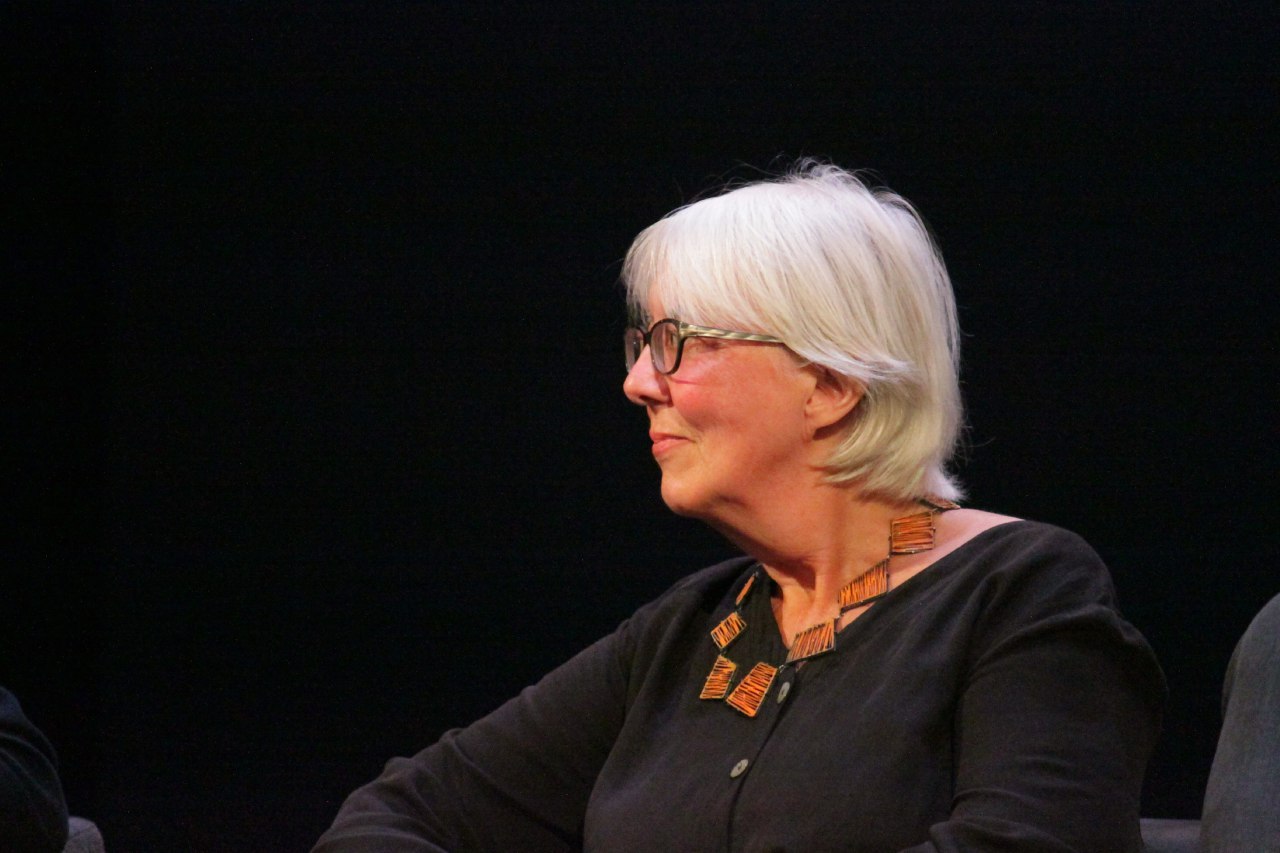
DiEM25 Coordinating Collective member, Rosemary Bechler, spoke about how creativity must operate across borders and boundaries, saying “if we are to reinvent our democratic cultures, we need the skills to be able to reach out across these boundaries and change people’s minds. And for that, my premise is that we need a culture of openness and generosity that acknowledges vulnerability as a strength.”
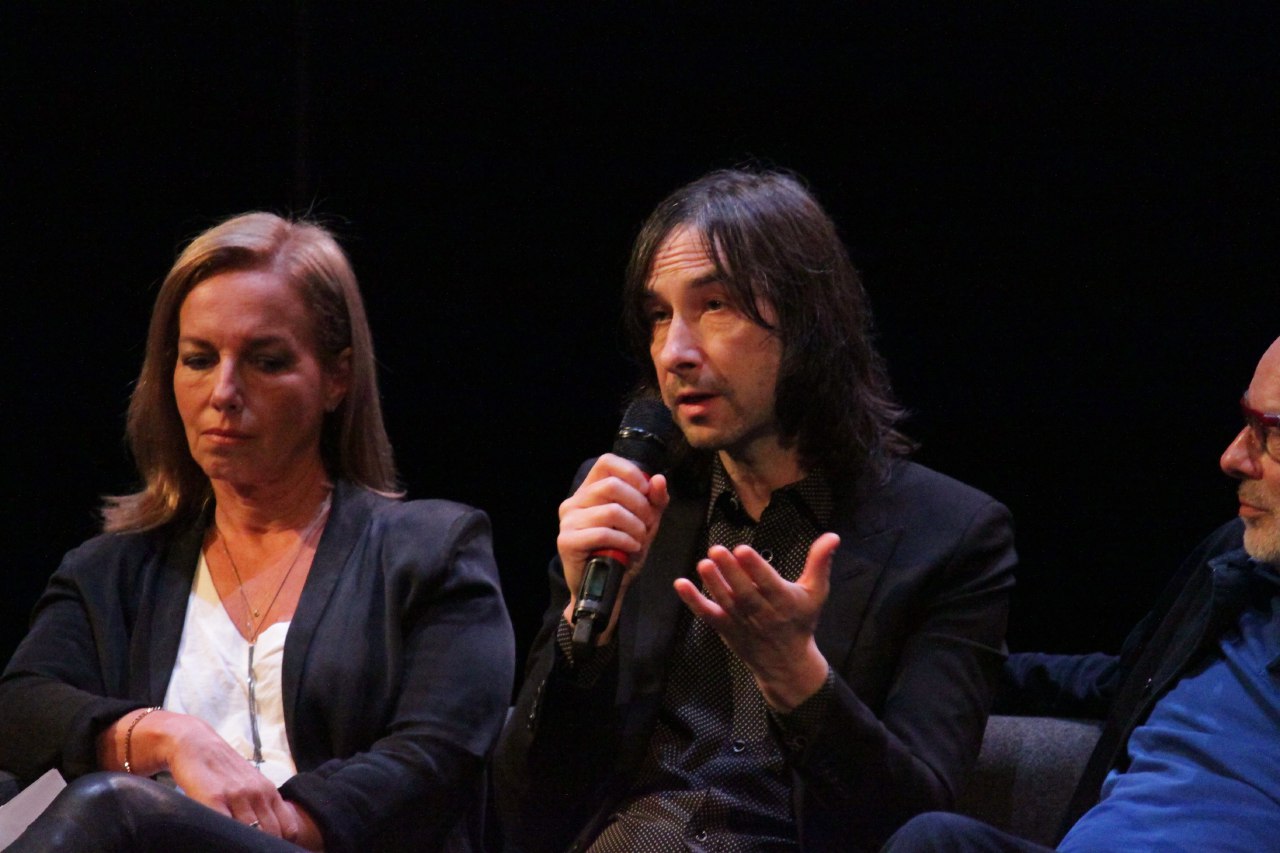
Primal Scream’s Bobby Gillespie talked about the importance of allowing young people the time and space to be creative. He added “my interest in punk-rock eventually led me to lead a creative life. I never went to art school, never went to university. I had a job at a factory, left school at 15. All that stuff was out of my reach and I never knew that I could be a creative person and I really do owe it all to the Sex Pistols, they were like my art school teachers.”
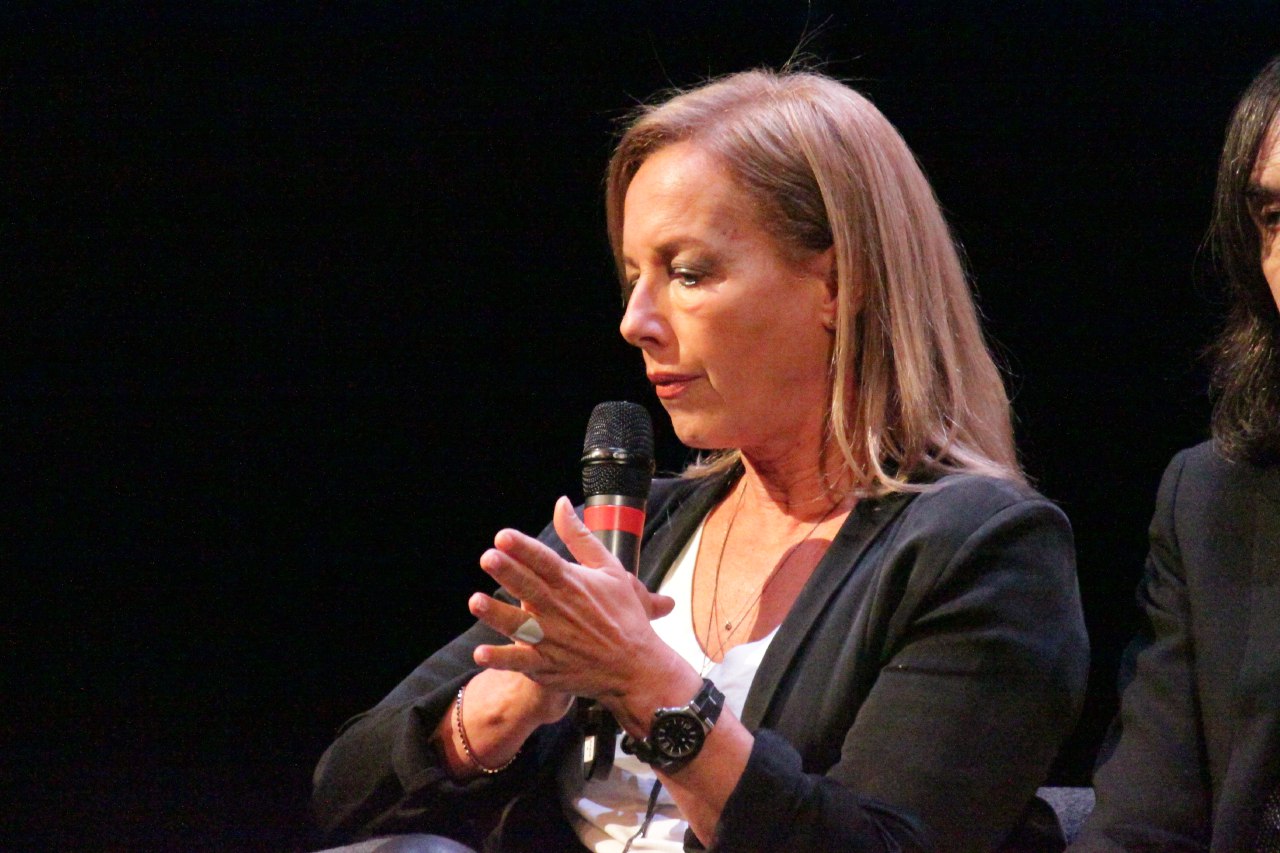
Danae Stratou, DiEM Voice Coordinating Collective member, talked about her work in raising awareness of environmental, social economic, cultural and humanitarian crises through art. “In Elefsina I was offered an opportunity by the local authorities, an abandoned factory where I could create a large scale installation. Inspired by the land’s ancient preoccupation with life and death, the task I gave myself was to create a site-specific installation that connected a number of issues simultaneously through the language of the aesthetic.”
Answering a question from the event’s moderator, Mary Fitzgerald, about the title of the art installation [Upon the Earth, Under the Clouds], Stratou said “The title was the key. It came from a documentary that I watched. It was in 2015 that I first started going in that area and looking around, and I was invited to look at it and perhaps come up with a proposal. It was at that moment in 2015, in the summer, that we started having all these images of babies and children drowning in the effort to come to Greece. So it was really devastating and I completely froze and thought ‘What can art do in a moment like that? What is the role of art?”.
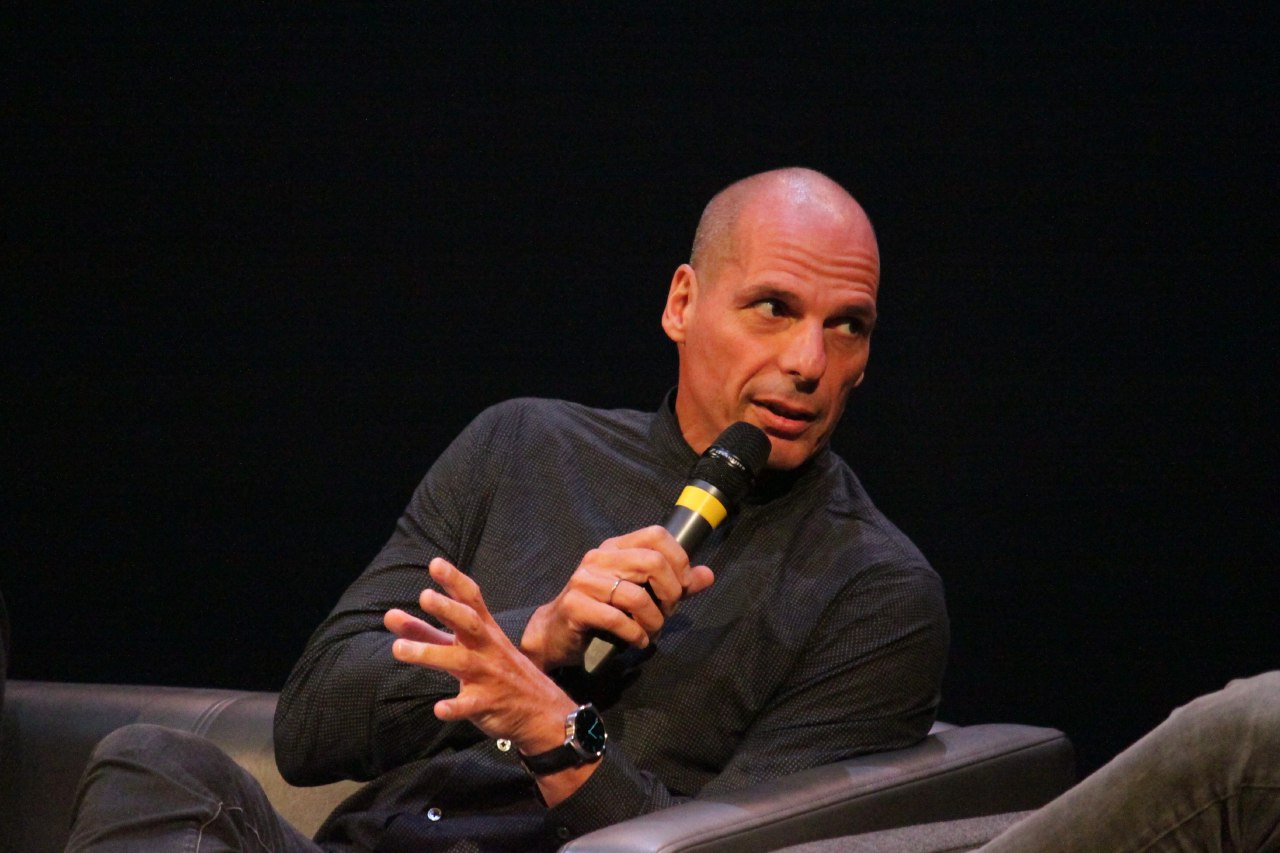
DiEM25 co-founder, Yanis Varoufakis, opened by saying that “to democratise society, to turn art into an instrument of defending the victims of the class war, we need to transcend individualist disruptions. We need our interventions to take place on the streets, in the neighbourhoods, in deprived state schools, in the communities.”
Varoufakis continued “DiEM Voice, with our event here at Central St Martin’s tonight, is inviting everyone to debate DiEM25’s art and culture policy agenda; the agenda best able to help us win this war. A policy agenda on its own is, of course, useless. But, a progressive movement needs a policy agenda to be inspired, to inspire and to have as a guide of what we want to do once powerful enough to do something significant.”
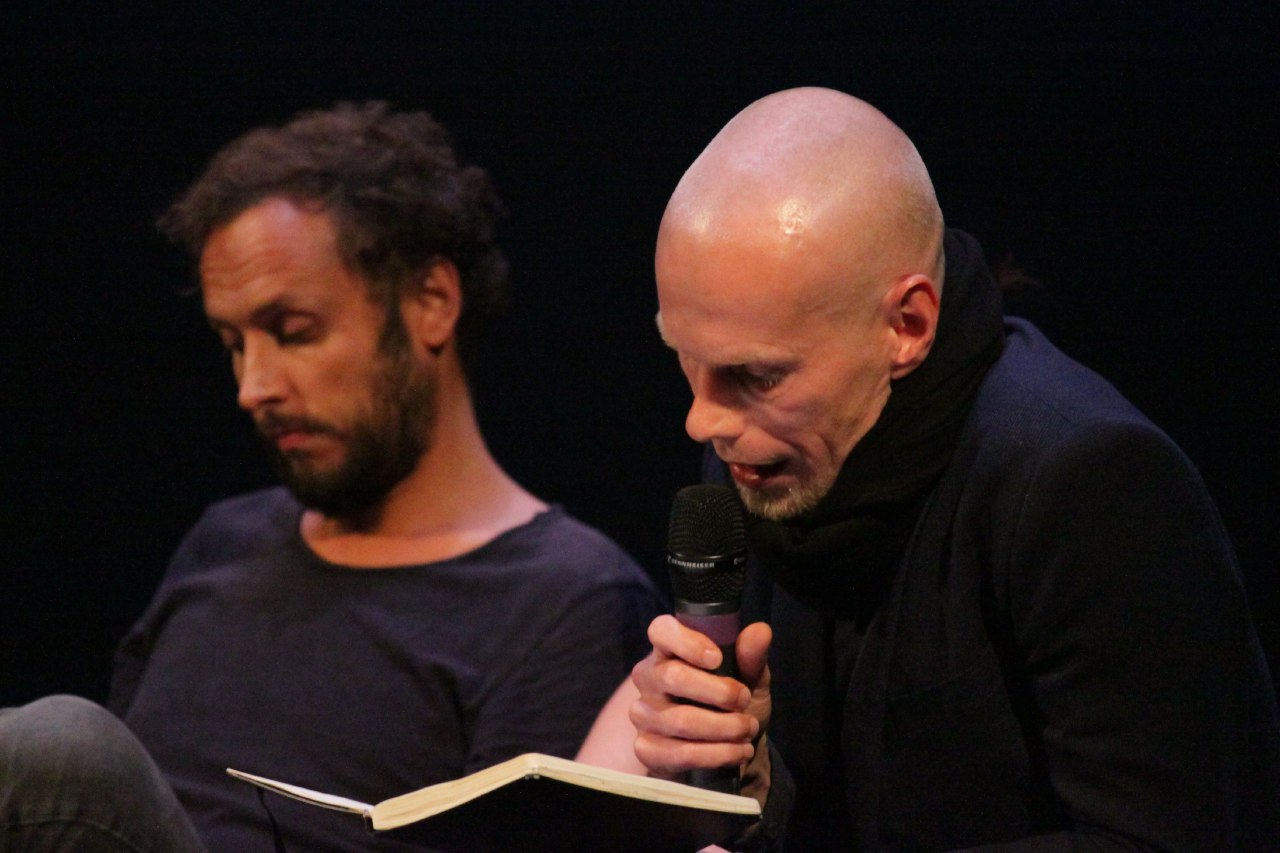
DiEM Voice Coordinating Collective member, Igor Stokfiszewski, wrapped up the event with the following poem that he wrote based on the content of each speaker’s presentation:
Culture war Here and Now,
The creative pleasant battleground.
Dangerous commodification at the very end of the auction.
Culture War.
Marginalised groups drew poetry from the future.
Where are we going.
Dance and madness.
Grown ups play in the dark.
Nationalists, the new fascist international is not dangerous.
What you need to defeat them is time, company and a little bit of money.
Culture war Here and Now.
Thousands of refugees, de-industrialisation of Greece, unemployment, humanitarian crises, language of aesthetics.
Art is an instrument of class war.
Class war Here and Now.
Bring on a new Europe. Clap your hands.
Get out of Saint Martins and fight!
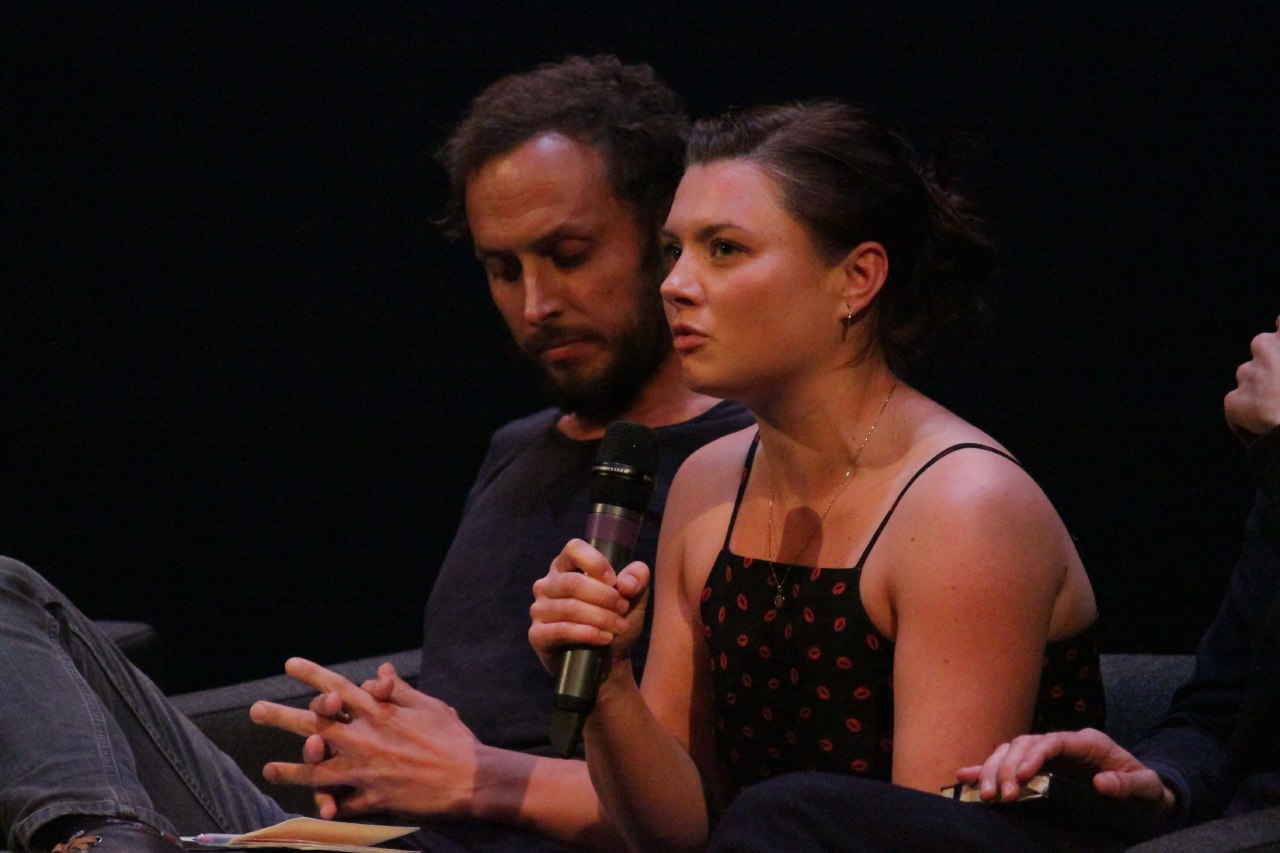
We are now inviting everyone to debate the 8th pillar of our Progressive Agenda for Europe: Vision for Culture. Find out how you can participate by clicking here.
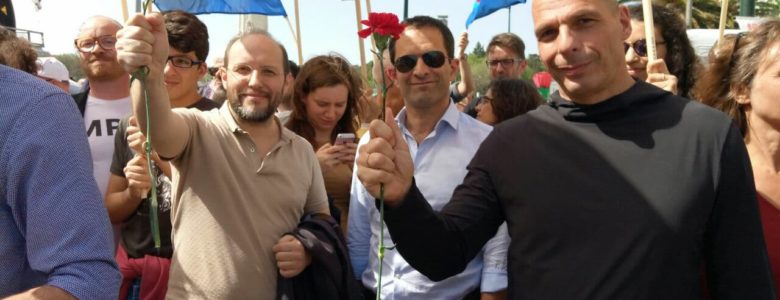
DiEM25’s State of the Union
In early September, European Commission President Jean-Claude Juncker delivered his last speech on the state of the Union — a lifeless ritual that has been copied from the United States. The speech serves primarily to the self-congratulate the European Commission, and this year’s speech was no different. Junker announced that he would “love Europe forever” and was treated to a standing ovation.
But DiEM25 takes this show as an occasion to examine the real situation in the EU, on the basis of the six EU core values set out in Article 2 of the Treaty on European Union.
1. Human dignity:
The EU’s blatant disregard for human dignity can be seen in our streets and on the seas.
The Nobel Peace Prize-winning EU has already drowned more than 1560 migrants in the Mediterranean in 2018 — many of whom were children. Member-state governments are still fighting the refugees instead of ending the wars that caused them to flee. In Europe, it is the passport that decides whose dignity is worth protection.
But it is not only refugees who have to fight for their dignity: since 2014 the number of homeless people in Germany, one of the richest countries in the world, has almost doubled to 860,000. Their insecurity in terms of basic shelter is an affront to EU’s professed values.
2. Freedom:
Key freedoms — of expression, association, and self-determination — are severely constrained in the EU.
A new police law in Lower Saxony regulates the interception of telephone conversations, e-mails and chat messages. The use of spyware is greatly simplified.
Meanwhile, the majority of the Catalan citizens would like to see the possibility of a referendum on Catalonia’s independence. Although this involves constitutional difficulties, instead of mediating, the European Union is either silent or takes a biased position in favour of the government in Madrid. The citizens of Catalonia have the right to be supported by the EU to resolve the matter in a democratic way.
In Hungary, the freedom of the press was curtailed by abolishing source protection. In addition, a number of government-critical media have had their licenses revoked.
3. Democracy:
One of the clearest trends in the European Union is the erosion of democracy and its institutions.
In Poland, the right-wing ruling party PiS is setting a new threshold of 16.5 percent in the electoral law for the next European elections, effectively blocking opposition parties from making a challenge.
In Hungary, after a constitutional reform, Viktor Orban had the constituencies cut so that his Fidesz party would gain 11% more seats in parliament without generating more votes.
In Greece, the troika, which was never democratically elected by the Greeks, has pulled the strings to determine the country’s fiscal policy until 2060.
Meanwhile, the European Parliament still has no right of initiative.
And contrary to the Guidelines of the Venice Commission of the Council of Europe — which stipulates that there should not be a change in the electoral law in the twelve months prior to an election — the European Parliament decided on a blocking clause for the European Parliament elections in Germany, which would make millions of votes ineffective.
4. Equality:
There is — put simply — no equality in Europe. The minimum wage in Luxembourg is €11.55 and in France €9.88, workers in Poland have to be satisfied with €2.85. In Bulgaria its even lower: €1.57.
The per capita income in Denmark is ten times higher than in Romania. There has hardly been an approximation of living conditions.
At least 1.5 million Greeks live in extreme poverty with less than 177 euros a month. That is about every seventh inhabitant of Greece.
Irrespective of this, there is a lack of conceptually penetrating equality between men and women in all European countries.
5. Rule of law:
Despite feeble attempts to rein in member-states, the rule of law is in decline.
In Poland, a new media law allows the government to decide directly on management positions in the public media.
In addition, the Polish Constitutional Court lost much of its authority: for example, instead of a 1/3 majority of constitutional judges, a 2/3 majority is now needed to stop laws against constitutional violations.
But even as legal systems come under increasing strain, the justice sector is drastically underfunded in almost all EU Member States. In Italy, for example, the average court time is 527 days.
6. Human and minority rights:
Migrants, newcomers, and minorities have far too few protections in the EU today.
In Austria, the governing party which calls for a “concentrated accommodation of asylum seekers”.
In Italy, an anti-EU government ruled by Lega Nord and its Secretary of the Interior Matteo Salvini, calls for violence against migrants and racial segregation in Italy’s public services.
According to Amnesty International, Slovakia operates “state racism” against Sinti and Roma.
In Germany, almost half of all lawsuits against rejected asylum claims are successful and thus wrong in the first instance to the detriment of the asylum seekers.
What can we conclude from this set of corrections to Junker’s triumphalist speech? The state of the Union is weak, with threats of disintegration on all sides. Many people do not see the European Union as a visionary project for peace, prosperity and legal certainty across Europe, but as a fragmented, opaque and unapproachable project for the economically strong European states.
DiEM25 is campaigning for a New Deal that will end austerity policies in the southern states, establish a solidarity programme for those who are lagging behind in economic progress, invest in Green Transition in order to transform Europe into a realm of prosperity and economic justice.
We are committed to strengthening national constitutional courts by linking them to the Copenhagen Commission in order to more effectively defend the challenged core values.
We want to abolish Article 51 of the EU Charter of Fundamental Rights, which allows governments to ignore the Charter without having to face penalties.
We bundle progressive forces across Europe to jointly defend the attacks by nationalists, right-wing populists and rabble-rouser on our core values.
Carpe DiEM!

Ryanair must change
For the last seven months, the pilots and crews of Ryanair have fought tooth and nail for their most basic workers rights. Their claim is simple: Ryanair must respect labour law and local jurisdiction. But Ryanair CEO Michael O’Leary — and the authorities to which he is accountable —refuse to listen.
Since its creation, Ryanair has been at the centre of many cost-saving scandals: underpaying its employees, under-fuelling its planes, and — of course — doing its best to dodge taxes.
At first, much of the public tolerated this behaviour on the basis that it would deliver gains to the consumer. Ryanair’s low prices would force the other companies to adapt, ultimately ensuring much more affordable plane tickets. This was considered a democratisation of plane travel.
Today, this is a much more mixed picture. The public is aware of the intolerable labour condition of their flying crew and the risks associated with this cost-cutting strategy. As a result, many are turning their back on the rotten dream of low cost air travel.
Alas, Ryanair’s management appears unmoved. Obsessed by chasing short-term profit, they maintain a heavy workload and wage pressure on their employees.
Ryanair workers, however, have not given up the fight. Answering the call of Portuguese, Italian, Ducth, Belgian, Spanish and German labour unions, flight crews of Ryanair have been leading a strike movement that’s drawing more and more attention. So far Ryanair has been keeping a hard stance toward this movement, but the cracks are appearing. The first blow came when the European Commission, not usually on the side of labour unions, recognised that Ryanair strikers had a fair claim. The second came when approval rate dropped within the Ryanair board when 30% of its members opposed the official hard line toward the employees’ demands.
This movement, known as “Ryanair Must Change,” is of central importance for the future of European labour relations. As Fernando Gandra, one of the organisers of the movement puts it: “when fighting against a multinational power you’ve got to organise on the multinational level”. This is exactly the philosophy that we promote in DiEM25 and the European Spring. To defeat transnational corporate powers such as Ryanair, we must widen our mobilisation strategies and widen our understanding of democratic accountability.
Ryanair strikers are opening the way for such a change of consciousness. They are on the frontline of the battle for a social Europe and we offer them our full support. By following in their steps we might be able to conquer new rights as citizens, new progress as workers, and new hopes as human beings.
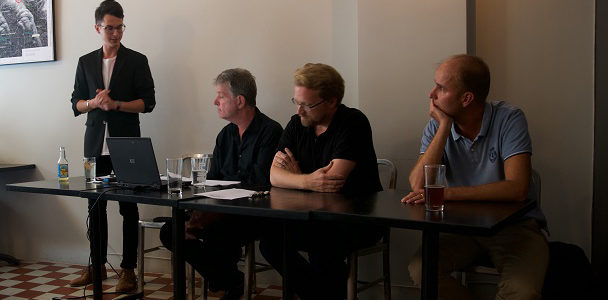
Democracy, xenophobia, and the political establishment: Stockholm DSC event report
Leading up to the Swedish parliamentary election on September 9, DSC Stockholm invited politicians, journalists and writers to discuss the rise of xenophobia in Sweden and what is to be done for democracy.
DiEM25 presented three topics for debate:
- Democracy in Europe and Sweden: What kind of democracy is offered by the Swedish parties, and how can a national democracy survive without a pan-European movement?
- Nationalism and Xenophobia: How can political movements answer to Swedish voters’ frustrations?
- Social class: Class today is not the class of yesterday. Rather, we find a clash between the guardians of the political establishment and a people that has lost its faith in democracy.
We also had Generation.s (Stockholm) as guest-speakers, discussing the European Spring and offering an up-to-date situation on French democracy.
All in all, the DSC event was a huge success — and DiEM25 Stockholm received great feedback, questions, and input for the road ahead.
Speakers were:
Democracy in Sweden: Joakim Löf (DiEM25) author and a former Green party member and active.
Nationalism and xenophobia: Kirill Filimonov (DiEM25 coordinator) Researching participatory politics and media activism at Uppsala University.
Classes and the Deep State: Mats Sederholm (DiEM25 coordinator) Author and articles-writer.
Update on French democracy: Christophe Premat (Generation.s) Academic and politician, National Assembly deputy in 2014-2017.
Follow DiEM25 Sweden on Facebook
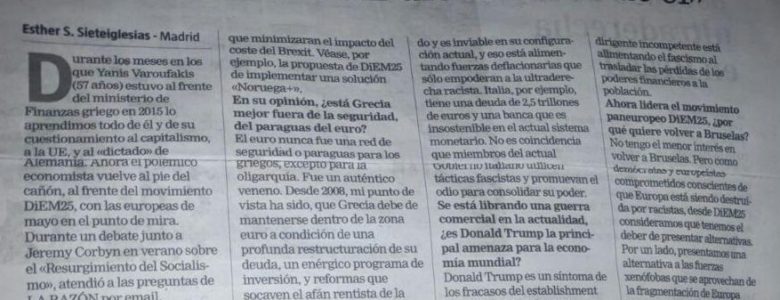
The DiEM25 line was clear: IN the EU, against THIS EU! Jeremy Corbyn and John McDonnell adopted that view – a clear, sophisticated opposition to Brexit
Yanis Varoufakis speaks to Spain’s daily, La Razón. Read his comments on Brexit, the EU and DiEM25´s progressive answer to the “Nationalist International”.
English version below, as per the e-mail exchange with the journalist.
Do you think Jeremy Corbyn’s apparently no stance regarding the Brexit helps him? Why isn’t he clear about if UK is better outside the EU or not?
Jeremy and I share views and experiences. One such experience is the brutal distortion of our views by the media. Who said that Jeremy is not clear on whether the UK is better off in or out of the EU? This is a preposterous and unfounded accusation. Jeremy and I campaigned powerfully before the referendum against Brexit. The DiEM25 line was clear: IN the EU, against THIS EU! Jeremy Corbyn and John McDonnell adopted that view – a clear, sophisticated opposition to Brexit. That Jeremy did not wax lyrical about the EU, presenting it as the best thing since sliced bread, is to his credit. He showed that he does not infantilise voters by presenting to them a grey world in black and white. This is to his credit.
After we lost the referendum to the Leavers, Jeremy and I refused to demonise those who voted for Brexit or to pursue a second referendum that would have poisoned Britain’s democracy forever – focusing instead on seeking ways to minimise the costs of Brexit, e.g. DiEM25’s proposal for a Norway Plus solution.
And speaking about socialism, what do you think about the resurgence of socialism in Spain? Were you happy to learn Pedro Sánchez is our new president? Or are you more fan of Podemos?
I was very glad to see the back of Mr Rajoy. And to see that Mr Sánchez rejected xenophobia and began to explore alternatives to austerity. However, until and unless the Spanish government develops a European strategy that reverses the current policy mix coming to us from Brussels, Frankfurt and Berlin, our societies will not be able to breathe within the EU. My fear is that neither PSOE nor Podemos are spending enough time developing such a strategy. I hope they do, together, and perhaps with DiEM25’s expertise to help them along.
In your opinion, is Greece better off out of the safety net, the umbrella of the euro?
The euro was never a safety net, an umbrella for the people of Greece, except for the oligarchy of course. It was nothing but pure poison. My view has been, since 2008, that Greece should stay in the eurozone on condition of a deep debt restructure, a large investment program and reforms that undermine the rent-seeking behaviour of the oligarchy. And that, if the EU authorities prevent all this by threatening us with a euro exit, we should be prepared to exit.
You have said that even though growth is back, the euro is still in danger, why?
There has been no sustainable, substantive growth. The euro is fragmenting and unsustainable, causing deflationary forces that only empower ultra-right wing, racist movements. Italy, to be precise, has a 2.5 trillion euro debt and a banking system that are unsustainable in this monetary system of ours. It is not a coincidence that it now has a government whose deputy prime minister is employing a fully fascist tactic of stirring up racial hatred by which to entrench his power.
There is a commercial war going on nowadays, is Donald Trump the main threat for the worldwide economy?
Donald Trump is a symptom of the liberal establishment’s failures. The crisis of 2008 destroyed the foundations of financialised corporate globalised capitalism. The establishment’s implementation of socialism for the financiers and austerity for everyone else gave rise to the Nationalist International that Mr Trump is heading in the US. We are re-living the post-1929 period when, at least in Europe, a clueless ruling class unwittingly fuelled fascism by attempting to transfer the financiers’ losses onto the masses.
You are now leading the pan-European movement DiEM25, why do you want to go back to Brussels?
I have no interest in going back to Brussels. But as committed Europeanist democrats who see Europe being destroyed by racists, we, the members of DiEM25 members, feel a duty to present Europeans with an alternative, on the one hand, to the authoritarian inanity of the neoliberal pro-EU establishment and, on the other, to the xenophobic forces that take advantage of Europe’s fragmentation to push us into a post-modern version of the 1930s.
Personally, years ago I thought austerity measures and the economy in general was going to break the EU. Now, I think it´s the migrationissue. Do you agree? What are your proposes/solutions within DiEM25 for this vital issue?
It is a mistake to separate austerity from the migration issue. Austerity has caused a permanent depression in countries like Greece, Italy, Portugal, the Baltics, Hungary, and a deflationary environment that eats into the middle class’ savings in places like Germany, Austria, the Netherlands. The insecurity and fear that this economic reality inspires into people, coupled with the complete loss of any uniting vision from the establishment politicians, is what gave the opening to racists to turn the migrant into a symbol of everything that is wrong about Europe. Just as in the mid-war period racism rose up on the back of a Great Depression, so too now xenophobia and the migration so-called crisis is wrecking the integrity and poisoning the soul of Europe. DiEM25’s answer to all this is our comprehensive, paneuropean New Deal for Europe policy agenda that combines (i) a program of 500 billion euros annually to be invested in the green economic transition – and, thus, creating millions of good quality jobs – and (ii) a radical migration policy based on our uncompromising slogan ‘Let Them In’.
Whenever Yanis Varoufakis is mentioned, the adjective “populist” follows your name. Do you like being in the same umbrella as for example politicians such as Matteo Salvini?
No politician in Europe has fought against populism more than I have. The fact that the establishment tries to paint everyone opposing its policies as populist is not something that causes me to lose any sleep. Ask your self this: Who enabled and empowered Brexit more? Varoufakis (who campaigned up and down in Britain against Brexit) or the authoritarian, anti-democratic, austerian policies and rhetoric of the European Central Bank, the European Commission, Mrs Merkel and the IMF? Who enabled and empowered Mr Salvin (whom I have branded a fascist) more? Varoufakis or Mario Monti, Mario Draghi and Matteo Renzi whose policies caused per capita income in Italy to decline year-in-year-out?
Knowing how difficult it all was, if Alexis Tsipras asked you again to be his Finance minister, would you accept?
Why would I want to serve in a government that has surrendered fully to the policies that we were elected, back in 2015, to reject?
Greece ended its third bailout deal with international creditors, the sacrifice Greeks have made is worth the sorrow?
I find your question painful. Why? Because it reminds me that the propaganda of Europe’s, and Greece’s, oligarchy has succeeded in conveying the illusion that the ‘bailout’ has ended. Nothing, but nothing, has ended. All that happened is that the money of the 3rd bailout has run out and we are entering 4th bailout program by another name. Ridiculous austerity continues (including fresh pension cuts, tax increases for the poorest and punitive tax rates for the middle class that will be introduced in 2019) while the Greek state’s insolvency is extended until 2060, home repossessions will accelerate, the young are living the country and businesses either go bankrupt or also leave the country. The only difference between the 4th and the 3rd bailout is that, instead of giving the Greek state new loans by which to pretend that we are repaying its old loans, they are now deferring loan repayment to after 2032,when they with interest.
Do Greeks live better now than in 2010, when the country was rescued for the first time?
Greece was never rescued. The French and German banks were rescued by means of loans amounting to 326 billion euros, all up between 2010 and 2015. Of this, the Greek state only got to keep 5%. What did the Greek people get out of this ‘rescue’? Here is the dismal list:
• 380 thousand young people left the country before 2015
• Another 200 thousand left after the summer of 2015 – with up to 15 thousand leaving every month as we spea
• 1 in 2 families have no member employed
• 60% of children today live under the 2008 poverty line
• One-third of Greek workers are forced to work for 384 euros per month (before tax)
• 700 thousand precarious workers are forced to prepay their taxes one year in advance
• Before 2015 pensions fell 40%. After the summer of 2015 they fell again 10%-20%, and then again by 18% in 2019
• The small solidarity payment to the poorest pensioners, abolished
• Citizens’ share of pharmaceutical and hospital bills reached 50%
• Half of medical school graduates migrate
• Heating allowance for poor families slashed 50%
• Income and sales taxes for poor families up
• Home evictions accelerate
• State railways, Piraeus & Thessaloniki ports, plus the Old Athens airport – sold to oligarchs for peanuts
• 14 regional airports sold to one state owned German company, with money provided by the Greeks
• Not one euro received from privatisations will be invested in Greece – it will all go to the creditors
• Greece’s death rate rises three times faster than rest of Europe
• Suicides are up 45%
• The debt is still rising
• National income is still 25% lower than in 2008
Do you regret anything of those months as Greece’s Finance minister? What about that interview with pictures having dinner with your then wife in the terrace in Athens that made it to the front pages of several media across the world?
I regret being far too accommodating to the troika; e.g. seeking a four month extension to our negotiations, assuming that the troika would be negotiating in good faith. They were simply not interested. In retrospect, I should have pulled the plug on the negotiations at the end of February 2015, defaulted on our debt to the ECB and activate our own payment system. As for the photo spread you mentioned, take a moment to think of what you are asking: Our people were condemned by the EU oligarchs to another thirty years of debt bondage and emigration and you are focusing on photos of my wife and I eating on our terrace (what a crime!).
In 2015, I remember reading about you every single day. Do you like being on the spotlight?
No, I did not like being in the spotlight, especially in a lifestyle context. Every time the media focussed on my motorcycle or my wife I knew they were doing it so as not to talk about our hungry, needy, distraught, desperate people. In 2015, and to this day, the international media are continuing to undermine their credibility with a behaviour that is unseemly.